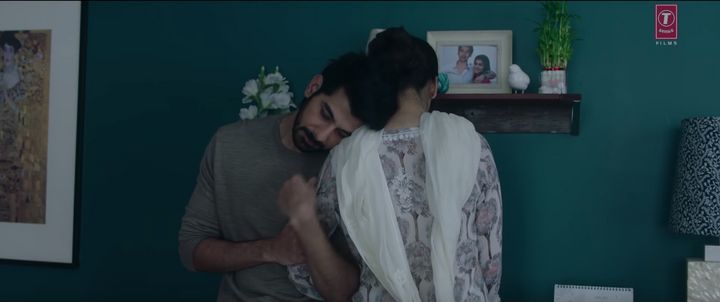Thappad which translates to ‘slap’ is an effective story of assertion of a woman who is not just against a single slap but against normalisation of male entitlement, perpetuated by generations of societal conditioning, both by men and women.
Like the promos suggested, Thappad is about domestic violence, but not as much about physical or corporeal aspect of the violence as about violation of personal dignity. For that’s what a slap does to a person; it does not just swell up the face of the receiver but deflates her self-respect in an instant, shows her ‘true place’ in the society which is subordinated to that of men and tells her that her feelings are secondary to the person who considers it his entitlement to slap.
For Amrita, a housewife by profession and (choice), played by Taapsee Pannu, the slap turns out to be eye opener. It draws her attention to everything that is unfair in their marital equation. It doesn’t matter if it was the first slap from a person whom she loved dearly, with whom she had no complaints about till the actual moment of being slapped.
For Amrita, a housewife by profession and (choice), played by Taapsee Pannu, the slap turns out to be eye opener. It draws her attention to everything that is unfair in their marital equation. It doesn’t matter if it was the first slap from a person whom she loved dearly, with whom she had no complaints about till the actual moment of being slapped. And it doesn’t matter that her husband Vikram was slightly drunk and hugely angered that an office promotion which he thought was happening was not coming through.

It doesn’t help that Vikram tries to make it up to her in the next few days, by taking her out for dinner and buying her an expensive piece of jewelry. What might have possibly helped was a heartfelt apology. Vikram does try a clumsy explanation the next morning about his unacceptable behavior the night before, which is loaded more with justification rather than remorse; not an apology but more of an apologist who continuously tries to provide a defense for the slap. He expects her to understand his state of mind, while not making the remotest effort to read hers. He laments about him not being valued at his work place while conveniently ignoring how devalued his wife could be feeling at being slapped in front of friends, colleagues and family.
Amrita does attempt but fail to get back to her earlier life. Quickly things escalate and the couple find themselves in a legal battle over divorce. What was impressive about Thappad is that the film maker, Anubhav Sinha, makes it difficult for us to not empathise with the husband; he is not a bad guy, a bit self-centered, but otherwise a decent husband, spoilt by the women in his life.
The portrayal of Vikram as an otherwise nice man was necessary to understand that violence against women are not simply committed by ‘monstrous’, lower class or lower caste men. The idea was to make the audience realise that educated and privileged men, who are probably respectful to their mothers and sisters and colleagues, often take their partners for granted and inflict harassment and violence on them. The fact which Amrita also painfully realises in a conversation with her lawyer, where she takes part of the responsibility in feeding his male entitlement.

The portrayal of Vikram as an otherwise nice man was necessary to understand that violence against women are not simply committed by ‘monstrous’, lower class or lower caste men. The idea was to make the audience realise that educated and privileged men, who are probably respectful to their mothers and sisters and colleagues, often take their partners for granted and inflict harassment and violence on them.
Amrita’s stance in Thappad might seem like an overreaction, and originally most characters in the film including her feminist lawyer feels like she is taking it too far. But for Amrita, who is also saddled with self-doubts on her move, the impracticality of her decision seems less important in face of her inner conviction. In a scene, she makes it clear to her lawyer that two things are non-negotiable for her, ‘happiness’ and ‘respect’, and she possibly couldn’t feel happy if she doesn’t feel respected.
Also read: Kabir Singh: The Poster Boy For Toxic Masculinity
While it maybe true that not all women might take Amrita’s position and we definitely cannot judge women for choosing to forgive the transgressions of their intimate partners for practical and emotional considerations, we cannot help but applaud Amrita’s integrity and her fight for fairness. But as a viewer, one might be concerned about Amrita’s future, as the movie doesn’t throw light on her abilities to provide for herself. Maybe it’s the film maker’s way of saying if a woman chooses to assert herself, the society will show her avenues to find her way, which is also something I strongly believe in.
Thappad also gives an interesting perspective as to how women are equal participants in normalising the patriarchal structures and believe it’s the right thing to put the family’s interests above theirs. And how otherwise even ‘woke’ men, can be conveniently lost in their comfort zone to overlook the feelings of the women around them.
The movie brings these subtle insights through not just its lead pair, but through several parallel stories involving Amrita’s parents, her mother-in-law, her house help, the equation of Amrita’s brother with his fiancé and her lawyer who is struggling with her own personal conflicts, while putting up a bold face to the world. Thappad also takes a clever jibe at Sandeep Reddy Vanga’s infamous stance on how slapping each other can be an expression of love in a couple through one of its characters.
Also read: I Am A Man And This Is How ‘Kabir Singh’ Is Damaging To Me
It is interesting that the film opens with its various characters across the age groups and social milieu enjoying an orange candy. Unlike the orange candy, patriarchy is the unfortunate equalizer among the different sections of population. It manifests differently in different households, and it might take whole generation of Amritas and Anubhav Sinhas to subvert the effect of centuries of conditioning. Movies like these make me feel hopeful.
Featured Image Source: Film Companion





Lovely article and well written. Please correct the “her’s” and “through” (hers and threw) to smooth out what is otherwise perfect.
Excellent!!!!